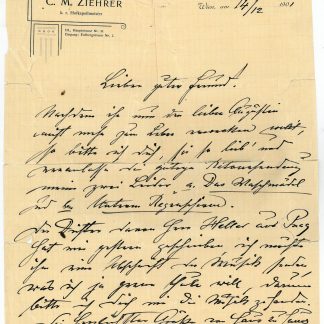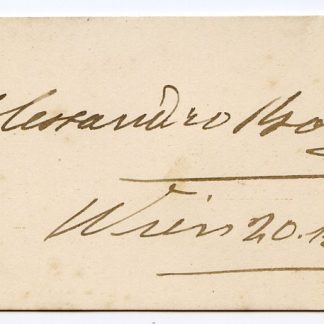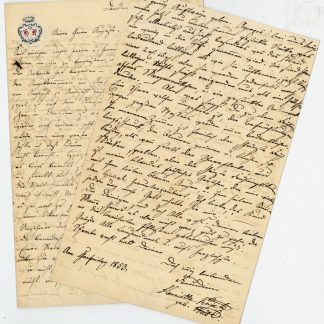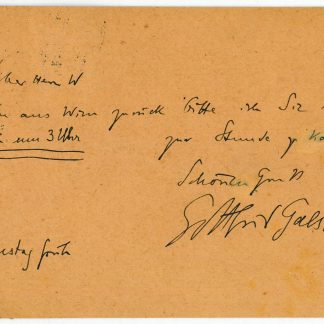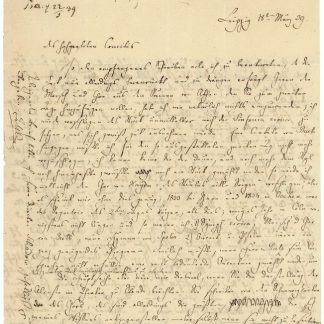Autograph letter signed.
4to. 4 pp. on bifolium.
€ 18,000.00
To the Committee for this year's Lower Rhenish Music Festival in Dusseldorf. Mendelssohn, the 1839 Director of the Lower Rhenish Music Festival, writes to the festival's committee recommending the works to be included. "I hasten to answer, as the time is indeed approaching and is beginning to press. Against the march and chorus from the Ruins of Athens, which you are adding to the second day, it is only natural that I have nothing to object; I would suggest putting the piece right after the Eroica Symphony, where it would certainly have a good effect. But I wouldn't know what cantata by Bach to suggest for the second day as now programmed; I don't know any which would fit in as regards the time it needs and even more as regards style; if another piece needs to be selected, I would perhaps suggest the chorus by Haydn 'Des Staubes eitle Sorgen' but it seems enough to me, anyway. In 1833 with you and 1834 in Aachen, the program of the 2nd day was shorter than this; last year in Cologne it was at least no longer, and so I think: 1) Eroica Symph[ony], march and chorus by Beeth[oven], new hymn by Spohr. 2) Overture and Psalm -would be quite a sufficient program. To be sure, if Herr Rietz doesn't keep his promise, quite a substantial overture would have to be selected, to make the second part as interesting as possible. But this time the main thing for me would be if you could manage to have Alceste performed in the theater. You write of the difficulties with the chorus; they are indeed the biggest ones that can place themselves in its way, to my knowledge, but even if they couldn't be removed, I would prefer seeing Alceste performed with a very bad chorus a hundred times more than giving up the idea completely. First, in Alceste the main thing is Alceste herself, then Admet, then Hercules, and then only the chorus, and with a performance to be expected from Frl. von Fassmann and Tichatschek or Eichberger or some other outstanding Admet, the chorus recedes in any case into the background. Then there is the second question if it is impossible to improve the chorus? Couldn't 12-20 of the best chorus singers be brought in from Cologne and Aachen? I would with pleasure come a week earlier myself for this and hold separate rehearsals for the chorus every day to make this performance possible. Finally, several passages could and in such a case would have to be deleted, such as the ball in the second act and similar passages in which the chorus plays too much of a main part, and as I said, that would be that much more feasible as Alceste herself and her and Admet's suffering are definitely the main thing in the opera. As several of your members know, I already felt the urgent wish for something new in the course and sequence of the music festival last year, and I said so. My suggestions on this were perhaps not practical, but now, through this coincidence, the opportunity arises this time in Dusseldorf, at least, of giving the festival a new attraction of the kind I had in mind. If this music festival performs the Messiah on the first day, then the Beethoven symphony with a miscellaneous program, and finally a Gluck opera (and even if it is most inferior in execution and even if it has the worst chorus, but beautifully sung in the main roles and beautifully played by the orchestra), this would indeed be something new, as I wished, and because of that this music festival would be outstanding as compared to all the earlier ones. I would therefore very much wish that this plan, even if it be only the hope of it, be mentioned already in your first tentative announcements - how differently would the music festival appear because of it! In the interest of the public, too; in regard to the box office it would also make a palpable difference. Of course I assume that the performance would have to be considered in conjunction with both the others, and only those would receive tickets to the opera who had attended the music festival on the preceding days or had been participants in it. And even if the prices were not raised, the proceeds would be significant. Not to mention the enjoyment all friends of music would derive from it. I ask you to let me know your answer as soon as possible, as I would, as I said, to this end make my departure earlier, if necessary. In any case your speedy answer is now very much desired, as the time is now fast approaching [...]" (transl.).
In a postscript, Mendelssohn has written: "The fine tenor here, Schmidt, just came to ask if he couldn't take part in the music festival; he would try to arrange things so that he could come there at that time and take a solo pan. I told him you had written Tichatschek, but he claims that he is giving guest performances in Berlin at Pentecost and would thus not be able to come to the Rhine. Also, the things that Schmoetzer and Eichberger, whom I mentioned to him, are also detained. So I don't hesitate to let you know about his wish. In a second postscript written in the left margin of the first page Mendelssohn has added; Please have the kindness to hand the enclosed letter over to Director Schadow" (transl.).
The Lower Rhenish Music Festival (Das Niederrheinische Musikfest) was one of the most important festivals of classical music, which happened every year with few exceptions between 1818 and 1958 at Pentecost for 112 times. The Festival was held in various German cities over time and the directors included Robert Schuman, Richard Strauss, Franz Liszt, Otto Goldschmidt, Anton Rubinstein, Hans Richter & Richard Strauss.
Light browning; small clipped section on f. 2.


